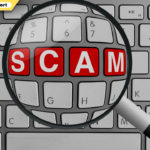GOAT is one of the most popular sneaker resale platforms, but many buyers wonder: Is GOAT a scam? With numerous complaints online about fake sneakers, poor customer service, and delayed shipping, it’s natural to question whether GOAT is legit. In this article, we’ll dive deep into GOAT’s operations, its authentication process, common complaints, and whether you can trust the platform.

Introduction to GOAT: What is It?
- What is GOAT?
GOAT is an online sneaker and apparel marketplace that connects buyers and sellers of rare, limited-edition, and high-demand sneakers. - Why Was GOAT Created?
It was founded to provide a trusted platform for sneaker reselling, ensuring authenticity and reducing fraud in the sneaker market. - Who Owns GOAT?
GOAT was founded in 2015 by Eddy Lu and Daishin Sugano. The company later merged with Flight Club, a well-known sneaker consignment store. - What Products Does GOAT Offer?
GOAT specializes in sneakers but also offers streetwear, luxury fashion, and accessories from brands like Nike, Adidas, Supreme, and more. - How Popular is GOAT?
GOAT has millions of users worldwide and is one of the most recognized sneaker marketplaces alongside StockX and eBay. - Does GOAT Sell Used Sneakers?
Yes, GOAT allows users to buy both new and used sneakers, with clear condition descriptions provided in listings. - Is GOAT Available Worldwide?
Yes, GOAT offers international shipping, though availability and pricing may vary based on the buyer’s location. - What Makes GOAT Different from Other Marketplaces?
GOAT’s authentication service and user-friendly buying process make it a top choice among sneaker collectors. - Is GOAT a Resale or Retail Platform?
GOAT operates as a resale platform, meaning most sneakers are sold by individual sellers rather than the brands themselves. - Is GOAT Only for Sneakers?
While sneakers are its primary focus, GOAT also sells apparel, accessories, and even luxury fashion from high-end designers.
Why People Question GOAT’s Legitimacy
- Reports of Fake Sneakers
Some customers claim they have received counterfeit shoes despite GOAT’s authentication process. - Delayed Shipping Issues
Buyers sometimes experience long shipping times, leading them to question GOAT’s efficiency. - Customer Service Complaints
Users report slow or unhelpful customer service when they encounter issues with orders. - Refund and Return Complications
GOAT has strict policies that make it difficult for buyers to get refunds if they receive incorrect or defective products. - GOAT’s Authentication Process Failing
Despite having a verification system, some users have claimed that fake sneakers have slipped through. - High Fees for Sellers and Buyers
GOAT charges both buyers and sellers fees, sometimes making transactions more expensive than expected. - Fake Listings and Scammers
While GOAT authenticates shoes, some buyers have encountered fraudulent sellers trying to list fake items. - Misinformation About Condition
Some buyers receive sneakers in worse condition than what was described in the listing. - Limited Seller Accountability
If a seller provides incorrect or misleading information, the resolution process can be slow or unfair. - GOAT vs. StockX Controversy
Many sneakerheads debate whether GOAT or StockX is the more trustworthy marketplace, adding to the confusion about GOAT’s legitimacy.
How GOAT Works: Buying and Selling Process
- Creating an Account on GOAT
Users must sign up and verify their identity before buying or selling on GOAT. - How to Buy Sneakers on GOAT
Buyers browse listings, check sneaker conditions, and place orders through the platform. - How to Sell Sneakers on GOAT
Sellers list their sneakers, set prices, and ship them to GOAT for authentication before they reach buyers. - GOAT’s Bidding and Offer System
Buyers can either purchase at the listed price or submit an offer that the seller can accept or decline. - GOAT’s Authentication Process for Sellers
Before items are sent to buyers, they go through an authentication process to verify their legitimacy. - Payment Processing for Sellers
Once GOAT verifies a sale, sellers receive their payments through PayPal, direct deposit, or GOAT credit. - Shipping and Delivery Expectations
Orders are shipped either directly from sellers or from GOAT’s storage facility, affecting delivery times. - GOAT Storage: How It Works
GOAT offers a storage feature where sellers can send their sneakers in advance, speeding up delivery once sold. - Return and Refund Process for Buyers
Returns are only accepted under specific conditions, and refunds are usually given in GOAT credit instead of cash. - What Happens If a Seller Sends a Fake?
GOAT rejects counterfeit items, but some reports suggest that fake sneakers have occasionally passed authentication.
GOAT’s Authentication Process: Is It Foolproof?
- What is GOAT’s Authentication Process?
GOAT inspects and verifies sneakers before they reach buyers to ensure they are authentic. - How Does GOAT Authenticate Sneakers?
Trained experts examine details like stitching, materials, and packaging to confirm authenticity. - What Happens If GOAT Detects a Fake?
If an item is found to be counterfeit, it is not sent to the buyer, and the seller may face penalties. - How Reliable is GOAT’s Authentication?
While GOAT claims to have a strict process, some buyers have still received fake sneakers. - Do All Sneakers on GOAT Get Authenticated?
Only items not labeled as “Pre-Verified” go through authentication before being shipped. - Who Are the GOAT Authenticators?
GOAT employs experts trained in sneaker authentication, but human errors still occur. - Has GOAT Ever Sold Fake Sneakers?
Some buyers have reported cases of fakes slipping through, sparking concerns about the process. - How Does GOAT Compare to StockX in Authentication?
Both platforms have similar verification methods, but users debate which is more effective. - Does GOAT Authenticate Used Sneakers?
Yes, used sneakers also go through verification, though they may have signs of wear. - Can You Trust GOAT’s Authentication?
While generally reliable, the process isn’t perfect, and buyers should still inspect purchases upon arrival.
Common Complaints About GOAT
- Long Shipping Delays
Many users report waiting weeks for their sneakers to arrive, even after authentication. - Receiving Fake Sneakers
Some buyers claim to have received fake sneakers despite GOAT’s verification process. - Poor Customer Service
Users frequently complain about slow response times and unhelpful support from GOAT. - High Seller Fees
GOAT charges sellers fees that some find excessive compared to other platforms. - No Cash Refunds
GOAT often issues store credit instead of cash refunds, frustrating some buyers. - Incorrect Sneaker Listings
Buyers sometimes receive the wrong size or model due to listing errors. - Difficulty Returning Items
GOAT’s strict return policy makes it challenging to get refunds for purchases. - Limited Buyer Protection
If an issue arises, buyers may struggle to get a resolution through GOAT’s support system. - Hidden Costs and Extra Fees
GOAT charges processing fees that aren’t always clear upfront. - Misleading Condition Descriptions
Some buyers have received sneakers in worse condition than what was advertised.
Are Fake Sneakers Sold on GOAT?
- Authentication Process – GOAT claims to have a thorough authentication process to prevent counterfeit sneakers from being sold. Experts inspect sneakers before they are shipped to buyers.
- Fake Sneakers Have Been Reported – Despite authentication efforts, some buyers have reported receiving fake sneakers, raising concerns about GOAT’s verification process.
- Seller Verification – Sellers on GOAT must provide detailed photos of the sneakers, which are reviewed before approval. However, some sellers have found ways to bypass strict checks.
- Used vs. New Sneakers – New sneakers go through GOAT’s verification, while used sneakers (from “Ship to Buyer” sellers) may not always be inspected before reaching the buyer.
- Return Policy for Fakes – If a buyer receives a fake, GOAT offers refunds or replacements, but proving a sneaker is fake can be a hassle.
- GOAT vs. StockX in Authentication – Some sneakerheads argue that StockX has stricter authentication standards than GOAT, though both have had counterfeit issues.
- Unauthorized Replicas – Some sellers have been accused of passing high-quality unauthorized sneakers (UA pairs) as authentic.
- AI & Tech in Authentication – GOAT uses AI and machine learning to improve verification, but mistakes still happen.
- Social Media Complaints – Reddit, Twitter, and sneaker forums have many complaints from users who claim they received fake sneakers from GOAT.
- Legal Action & Reputation – GOAT has not faced major lawsuits over counterfeit sneakers, but ongoing complaints continue to hurt its reputation.
GOAT vs. StockX: Which is More Trustworthy?
- Authentication Standards – StockX and GOAT both claim to have expert authenticators, but StockX has faced more public scandals regarding fake sneakers.
- Refund Policy – GOAT offers better refund options than StockX, which has a strict “all sales final” policy, making it riskier for buyers.
- Price Comparison – GOAT often has lower prices on some sneakers compared to StockX due to different fee structures.
- Seller Requirements – StockX only allows brand-new sneakers, while GOAT allows both new and used sneakers, which can impact authenticity.
- Customer Service – GOAT has mixed reviews about its customer support, while StockX has a reputation for slow or unhelpful responses.
- Shipping Speed – StockX usually takes longer to deliver because it requires sneakers to be authenticated before shipping, while GOAT’s “Ship to Buyer” feature can be faster.
- Fake Sneaker Reports – Both platforms have had fake sneaker issues, but StockX has had more high-profile cases exposed online.
- User Experience – GOAT’s app and website are generally seen as more user-friendly than StockX.
- Market Popularity – StockX is often preferred for investment-grade sneakers, while GOAT is popular for everyday buyers looking for used pairs or deals.
- Overall Trust Score – GOAT is often considered more flexible and reliable, while StockX is stricter but has been involved in more fake sneaker scandals.
Hidden Fees and Extra Charges on GOAT
- Buyer Fees – GOAT charges a processing fee on all purchases, which varies depending on location and payment method.
- Seller Fees – GOAT takes a percentage of each sale from sellers, usually between 9.5% to 15%, depending on seller status.
- Shipping Costs – Buyers must pay shipping fees, which range from $10 to $30+ depending on location and shipping method.
- International Duties & Taxes – Buyers outside the U.S. often face high import duties and taxes, which are not included in the listed sneaker price.
- Instant Transfer Fees – Sellers who want to withdraw their money instantly are charged additional fees.
- Currency Conversion Fees – International buyers may pay extra due to currency exchange rates when purchasing sneakers.
- Return Shipping Costs – If a buyer returns sneakers due to sizing issues (not authenticity problems), they must pay for return shipping.
- GOAT Credit vs. Cash Refunds – In some cases, GOAT only offers store credit for refunds instead of cash.
- Priority Processing Fees – Buyers can pay extra for priority authentication and faster shipping.
- App Transaction Fees – If paying through certain payment methods, additional transaction fees may apply.
Customer Reviews and Experiences with GOAT
- Positive Reviews – Many buyers praise GOAT for its large selection, ease of use, and ability to find rare sneakers.
- Fake Sneakers Complaints – Some buyers have reported receiving fake sneakers, despite GOAT’s authentication process.
- Slow Shipping Issues – Many customers complain that GOAT’s delivery process takes longer than expected, sometimes weeks.
- Customer Service Problems – Negative reviews often mention GOAT’s customer support being slow or unhelpful.
- Successful Returns & Refunds – Some users report smooth refund experiences when their sneakers were found to be fake.
- High Fees Frustration – A common complaint is GOAT’s hidden fees, which can make sneakers more expensive than expected.
- Sellers Facing Payout Issues – Some sellers say GOAT has delayed or even denied payouts without clear explanations.
- Damaged Packaging Issues – Buyers have received sneakers in damaged boxes, reducing resale value for collectors.
- Better for Used Sneakers – Some buyers prefer GOAT over StockX for used sneakers due to better pricing and selection.
- Trust Issues Growing – While GOAT is popular, trust in sneaker resale platforms is declining due to ongoing fake sneaker scandals.
GOAT’s Shipping and Delivery Issues
- Slow Delivery Times – Many users report waiting weeks for their sneakers, even when estimated delivery times were much shorter.
- Lost Packages – Some buyers claim their sneakers were lost in transit, and GOAT’s response was slow or unhelpful.
- Delayed Authentication – Even when sneakers arrive at GOAT for authentication, some orders are delayed due to backlog issues.
- Shipping Carrier Problems – GOAT uses different carriers, and some customers report unreliable service or delays from these third-party companies.
- High International Shipping Costs – Buyers outside the U.S. often pay extremely high shipping fees, making purchases less attractive.
- Incorrect Order Shipments – Some customers report receiving the wrong size or even the wrong sneaker model.
- Seller Shipping Issues – Sellers have reported delays in getting their sneakers processed and sold after shipping to GOAT.
- Tracking Issues – Some users complain that GOAT’s tracking system is not updated properly, making it hard to know where their sneakers are.
- Express Shipping Not Always Reliable – Even when buyers pay for priority shipping, some orders still arrive late.
- Better for U.S. Customers – Shipping tends to be faster and more reliable for U.S. customers compared to international buyers.
How GOAT Handles Disputes and Refunds
- Verification Process – GOAT has an authentication process to ensure sneakers are legit before shipping.
- Buyer Protection – If a buyer receives fake, incorrect, or damaged sneakers, GOAT offers refunds or replacements.
- Dispute Resolution – Users can raise disputes through GOAT’s customer support within three days of receiving their order.
- Return Eligibility – GOAT allows returns for items labeled “returnable,” but final sale items are not eligible.
- Refund Method – Refunds are typically issued as GOAT credits or back to the original payment method, depending on the case.
- Shipping Issues – If a package is lost or stolen during transit, GOAT investigates and may issue a refund.
- Seller Responsibilities – Sellers must ship items within a certain timeframe; failure to do so can result in penalties.
- Counterfeit Concerns – If a buyer receives a counterfeit item, GOAT will refund them and ban the seller.
- Processing Time – Refunds typically take 3-7 business days after the issue is resolved.
- Customer Support Response Time – GOAT’s response time varies, but they prioritize cases involving fakes or damaged goods.
Can You Get Scammed on GOAT?
- Fake Listings Risk – While GOAT authenticates sneakers, some scammers try to sell fake items through loopholes.
- Unauthorized Sellers – Private sales outside the GOAT app are risky, as scammers might take money without sending shoes.
- Fake Refund Promises – Some scammers attempt chargeback fraud after receiving legit shoes from GOAT.
- Package Theft – Buyers might claim non-receipt when a package is delivered but stolen from their doorstep.
- Account Takeover – Hackers can steal accounts and use stored payment info to make fraudulent purchases.
- Bait-and-Switch Scams – Some dishonest sellers ship incorrect items, hoping buyers won’t notice or complain.
- Misleading Condition Descriptions – Some listings show pristine sneakers, but buyers receive worn-out pairs.
- Delayed Shipping Scams – Sellers who repeatedly fail to ship can cause frustration and financial loss for buyers.
- Counterfeit Accessories – While shoes are authenticated, accessories like extra laces or dust bags could be fake.
- Social Media Scams – Scammers impersonate GOAT on platforms like Instagram, tricking users into off-platform deals.
How to Spot Fake Sneakers on GOAT
- Check Seller Ratings – Sellers with low ratings or new accounts may not be trustworthy.
- Verify GOAT Tags – Authentic sneakers from GOAT often come with an authentication tag; compare with official examples.
- Compare Product Details – Look at stitching, color accuracy, logo placement, and font size compared to official sneakers.
- Box and Label Inspection – Check for spelling errors, barcodes, and SKU numbers matching the actual model.
- Smell Test – Fake sneakers often have a strong glue or chemical smell compared to authentic shoes.
- Weight and Shape Differences – Fake shoes might feel lighter, have incorrect curves, or be slightly off in size.
- Look at the Insoles – The insole logo print and texture should match official pairs.
- UV Light Test – Some fakes fail to show the correct branding or patterns under UV light.
- Check Factory Stamps – Real sneakers have factory stamps inside the box that match production info.
- Use Legit Checking Services – If unsure, send pictures to sneaker authentication services for verification.
Legal Issues and Consumer Protection Related to GOAT
- Counterfeit Liability – GOAT is responsible for ensuring products are authentic, but disputes can arise if a fake slips through.
- Consumer Refund Rights – Laws vary by country, but buyers can demand refunds if items are misrepresented.
- Seller Accountability – GOAT holds sellers to strict standards, but some may attempt fraud or mislead buyers.
- Data Privacy Concerns – GOAT collects user data, raising concerns about how it is stored and used.
- Chargeback Fraud – Buyers and sellers can exploit chargebacks, leading to financial losses and legal issues.
- Cross-Border Trade Regulations – Import taxes and sneaker resale laws differ across countries, affecting transactions.
- Intellectual Property Disputes – Some brands have taken legal action against counterfeit sales on resale platforms.
- Terms of Service Enforcement – GOAT can ban users who violate their terms, but this sometimes leads to legal disputes.
- False Advertising Cases – Buyers can sue if GOAT misrepresents sneaker authenticity or condition.
- Government Regulations – Authorities monitor resale platforms to prevent money laundering and unfair business practices.
The Role of Resale Marketplaces in Sneaker Culture
- Hype-Driven Economy – GOAT and similar platforms fuel sneaker hype by making rare shoes accessible.
- Price Inflation – Resale marketplaces drive up prices due to limited stock and high demand.
- Authenticity Assurance – Platforms like GOAT reduce fraud by verifying sneakers, boosting buyer confidence.
- Global Sneaker Access – Buyers can get exclusive releases worldwide, expanding sneaker culture beyond local markets.
- Sneaker Investment Boom – Resale platforms have turned sneaker collecting into a profitable investment strategy.
- Brand Collaboration Exposure – Hype around sneaker drops from Nike, Adidas, and others increases due to resale hype.
- Shift from Retail to Resale – Some sneakerheads prefer GOAT over retail stores due to convenience and variety.
- Resale Ethics Debate – The high resale prices lead to debates on whether reselling helps or harms sneaker culture.
- Rise of Sneaker Bots – Automated purchasing tools have changed how people buy and resell sneakers.
- Cultural Status Symbol – Sneakers have become more than footwear; they represent status, taste, and identity.
Alternatives to GOAT for Buying Sneakers
- StockX – A major sneaker marketplace with authentication services.
- Stadium Goods – High-end sneaker retailer with a focus on rare kicks.
- Flight Club – A trusted sneaker resale store with physical locations.
- eBay Sneakers – Offers authentication for eligible sneakers.
- Grailed – A marketplace for sneakers and streetwear with buyer protection.
- Klekt – European-based sneaker marketplace with authentication services.
- Tradeblock – A unique platform allowing users to trade sneakers.
- Reddit’s r/sneakermarket – Community-driven sneaker trading with peer reviews.
- Facebook Marketplace – Can find deals locally but requires extra caution.
- Sneaker Con App – Offers legit checks and authentication for sneakers.
How to Avoid Scams When Buying Sneakers Online
- Buy from trusted platforms – Stick to reputable marketplaces like GOAT, StockX, and eBay.
- Check for authentication services – Ensure the seller or platform verifies the sneakers.
- Avoid deals that seem too good to be true – Unrealistically low prices often signal scams.
- Look at seller reviews and ratings – A strong history of positive feedback is essential.
- Use secure payment methods – Pay with PayPal, credit cards, or escrow services, never wire transfers.
- Request detailed photos – Ask for pictures of box labels, receipts, and different angles.
- Verify the seller’s history – Use Google, forums, and social media to check for scam reports.
- Beware of fake websites – Double-check the URL and look for signs of legitimacy.
- Meet in safe public places for local deals – Avoid private locations when buying in person.
- Use legit-checking services – Apps like CheckCheck and Legit App can help verify authenticity.
Expert Opinions on GOAT’s Authentication Process
- Sneaker YouTubers – Many content creators praise GOAT’s authentication but note occasional errors.
- Resellers – Experienced resellers generally trust GOAT but sometimes prefer StockX.
- Industry Insiders – Some former employees claim authentication is thorough, but mistakes happen.
- Collectors – Sneakerheads report mostly positive experiences but occasional fakes slipping through.
- Third-Party Authenticators – Services like Legit App occasionally spot errors in GOAT’s verification.
- Reddit & Forums – Users debate GOAT’s accuracy, with most agreeing it’s reliable but not perfect.
- Retail Employees – Some claim GOAT’s authentication is better than in-store checks.
- Brand Experts – Nike and Adidas reps say third-party authentication is useful but not 100% foolproof.
- Lawyers & Consumer Advocates – They warn that authentication doesn’t guarantee a refund if an issue arises.
- Trustpilot & BBB Reviews – Mixed reviews, with most praising GOAT but some citing delays or disputes.
Final Verdict: Is GOAT a Scam or Legit?
- Legit, but not perfect – GOAT is widely trusted, but mistakes happen.
- Authentication is strong – GOAT’s legit-checking process reduces fakes significantly.
- Refund policies can be strict – Some customers struggle with returns and disputes.
- Shipping times vary – Delays occur, especially for international orders.
- Customer service mixed – Some praise it, others find it unresponsive.
- Used by top resellers – Many professional sneaker sellers use GOAT.
- Better than some alternatives – Safer than peer-to-peer platforms but not as regulated as retail stores.
- Higher fees than direct buying – You may pay a premium for authentication.
- Sellers also face risks – Reports exist of payouts being delayed or canceled.
- Final verdict: Mostly legit – Reliable for most users, but proceed with caution.
How to Spot a Fake Listing on GOAT
- Unverified sellers
- Extremely low prices compared to market value
- Poor-quality images or lack of details
Final Verdict: Is GOAT a Scam?
GOAT is not a scam, but it has flaws. While most transactions go smoothly, there are cases of fake sneakers slipping through authentication. If you choose to buy from GOAT, be cautious and verify your purchase upon arrival.
Conclusion
While GOAT is a legitimate sneaker marketplace, it is not without its issues. Most buyers receive authentic products, but some have encountered fake sneakers and poor customer service. If you’re purchasing from GOAT, always check seller reviews, authenticate your purchase upon arrival, and be aware of potential shipping delays. Overall, GOAT is not a scam, but buyers should exercise caution to ensure a smooth transaction. For more on recognizing scams, check out these 7 red flags to watch out for.
FAQs
Can I trust GOAT to sell authentic sneakers?
Yes, but occasional mistakes happen.
What should I do if I receive a fake sneaker from GOAT?
Contact customer support and request a refund.
Does GOAT offer refunds for unauthenticated items?
Yes, if you can prove the item is fake.
How long does it take for GOAT to authenticate and ship shoes?
Typically 7-10 days, but it can take longer.
Is GOAT better than StockX for buying sneakers?
It depends on your preference—GOAT offers used shoes, while StockX focuses on new items.










